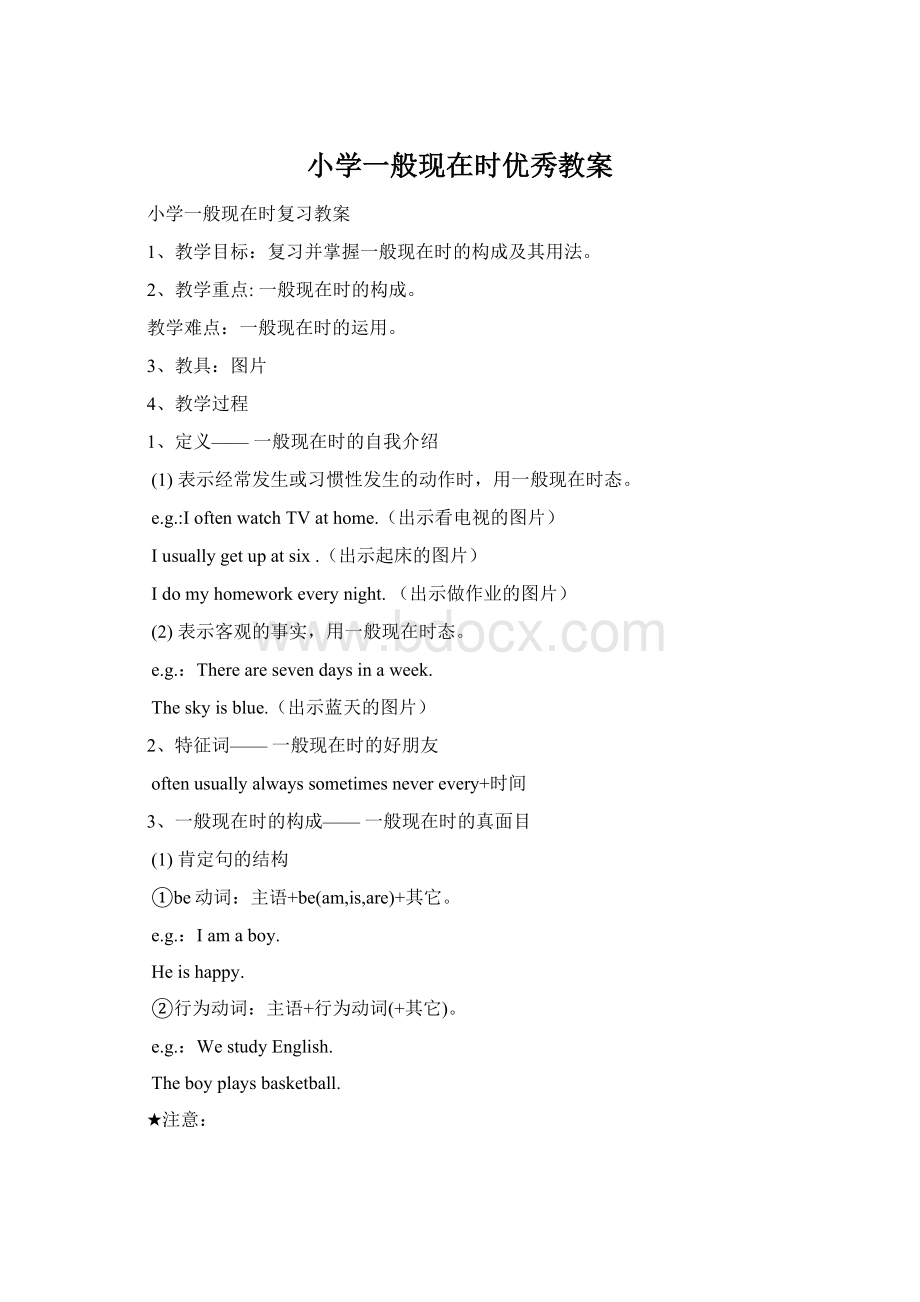小学一般现在时优秀教案.docx
《小学一般现在时优秀教案.docx》由会员分享,可在线阅读,更多相关《小学一般现在时优秀教案.docx(12页珍藏版)》请在冰豆网上搜索。

小学一般现在时优秀教案
小学一般现在时复习教案
1、教学目标:
复习并掌握一般现在时的构成及其用法。
2、教学重点:
一般现在时的构成。
教学难点:
一般现在时的运用。
3、教具:
图片
4、教学过程
1、定义——一般现在时的自我介绍
(1)表示经常发生或习惯性发生的动作时,用一般现在时态。
e.g.:
IoftenwatchTVathome.(出示看电视的图片)
Iusuallygetupatsix.(出示起床的图片)
Idomyhomeworkeverynight.(出示做作业的图片)
(2)表示客观的事实,用一般现在时态。
e.g.:
Therearesevendaysinaweek.
Theskyisblue.(出示蓝天的图片)
2、特征词——一般现在时的好朋友
oftenusuallyalwayssometimesneverevery+时间
3、一般现在时的构成——一般现在时的真面目
(1)肯定句的结构
①be动词:
主语+be(am,is,are)+其它。
e.g.:
Iamaboy.
Heishappy.
②行为动词:
主语+行为动词(+其它)。
e.g.:
WestudyEnglish.
Theboyplaysbasketball.
★注意:
①当句子主语是I,we,they,you(第一、二人称)或复数名词时,动词用动词原形。
②当句子的主语是he,she,it或单数名词(第三人称单数)时,动词要用第三人称单数的现在式形态(在动词后面加"-s"或"-es")。
e.g.:
MarylikesChinese.
★复习:
人称
单数
复数
第一人称
I
we
第二人称
you
you
第三人称
He\she\it
they
一般动词后加s
wears,reads,works,makes,likes,laughs,buys
以s,x,ch,sh结尾,后加es
watches,brushes,teaches,guesses,catches.
以辅音字母+o结尾,一边加es
goes,does
辅音字母+y结尾的单词,变y为I,加es
Worries,carries
第三人称单数动词变化——叮当法术变变变!
特殊形式:
have---has
★课堂巩固操练——出示图片,请学生造句(分4个小组各造一句)
图片组1:
Tom、cleantheroom
图片组2:
ACat、eatfish
图片组3:
Mary、watchTV
图片组4:
Mymother、workinafactory
★练习——考考你
1.把下列人称归类
Tom,Jiamin,I,myfather,you,they,mycousin,herdaughter,ourteacher,he,she,it,yoursister,hisfriend,hisfriends,theirbrother,theirbrothers,thecat,littledog,thetable,mybag
第一人称:
第二人称:
第三人称单数:
第三人称复数:
2.选择适当的词填空
(1)I______(have,has)abeautifultoybear.
(2)They_____(have,has)somepostcards.
(3)Tim______(have,has)anewbasketball.
(4)Mysister________(have,has)threegreenskirts.
(5)I_________(like,likes)playingchess.
(6)He_______(like,likes)listeningtotheradio.
(2)否定句的结构
①be动词:
人称+Be(am,is,are)动词否定形式+其它.
Be动词的否定形式
肯定形式
否定形式
缩写形式
am
amnot
\
is
isnot
isn’t
are
arenot
aren’t
e.g.:
Iamnotaboy.
Heisn’thappy.
②行为动词:
人称+助动词否定形式+行为动词(+其它)
第三人称单数一般现在时的否定形式,在行为动词前加doesn’t(doesnot).
e.g.:
Igetsupearly.
Idon’tgetupearly.
Wedon’tstudyEnglish.
★注意:
一旦遇见“doesn’t”“do”这两个词时,动词必须还原。
e.g.Thegirllikeseatingfruitsverymuch.
Thegirldoesn’tlikeeatingfruitsatall.
Doesthegirllikeeatingfruits?
★课堂巩固操练——出示图片,请学生造否定句(重复用上个环节图片,分男女2组各造两句)
图片组1:
Tom、cleantheroom
图片组2:
ACat、eatfish
图片组3:
Mary、watchTV
图片组4:
Mymother、workinafactory
★练习——考考你
把下面的句子改为否定形式:
Heisaworker._______________________________
Heoftenplaybasketball._______________________________
Thestudentsarehappyeveryday._____________________________________
Iusuallygotothezoowithmymother.________________________________________
Wespendtwohoursonourhomeworkeverynight.__________________________________
Thecatlookslovely._____________________________________________
Theydanceafterschool.____________________________________________
(3)一般疑问句的结构
(一般疑问句读音升调)
①Be动词+主语+其它?
Yes,主语+Be动词.
No,主语+Benot.
E.g.:
AreyouJim?
——Yes,Iam(这里不能缩写).\No,I’mTom.
Isyourfathertall?
——Yes,heis.\No,heisn’t.
②助动词(do\does)+主语+动词原形(+其它)?
Yes,主语+do\does.
No,主语+do\doesnot.
E.g.:
Doyouhaveastorybook?
——Yes,Ido.\No,Idon’t.
DoesLilygotoschoolbybike?
Yes,shedoes.\No,shedoesn’t.
★课堂巩固操练——课堂现场情景句子转换
师:
Heisinred.——生:
Isheinred?
Yes,....\No,....
师:
Sheisbeautiful.——生:
Isshebeautiful?
Yes,....\No,....
师:
Shelooksthin.——生:
Doesshelookthin?
Yes,....\No,....
师:
...——生:
...
师:
...——生:
...
师:
...——生:
...
师:
...——生:
...
师:
...——生:
...
③如果主语是thisthat,回答时用it代替,如果问句中主语these,those,回答时用they′代替。
e.g.Isthisyourbag?
——Yes,itis.\No,itisn’t.
Arethoseoranges?
——Yes,theyare.\No,theyaren’t.
★课堂巩固操练——课堂现场情景句子转换
师:
Thisishisbook.——生:
Isthishisbook?
Yes,itis.\No,itisn’t.
师:
Thatisaschoolbag.——生:
Isthataschoolbag?
Yes,itis.\No,itisn’t.
师:
Thisonemakesmehappy.——生:
Doesthisonemakeyouhappy?
Yes,itdoes.\No,itdoesn’t.
师:
Thesearedesks.——生:
Arethesedesks?
Yes,theyare.\No,theyaren’t.
师:
...——生:
...
师:
...——生:
...
师:
...——生:
...
师:
...——生:
...
④陈述句变一般疑问句应注意的事项
a.如果陈述句中有第一人称,则变问句时最好要变为第二人称。
e.g.:
Iusuallyhavelunchatschool.
→Doyouusuallyhavelunchatschool?
Myfatherisplayingsoccer.
→Isyourfatherplayingsoccer?
b.如果陈述句中有some,则变问句时往往要变成any。
e.g.:
IhavesomefriendsinAmerica.
→DoyouhaveanyfriendsinAmerica?
★课堂巩固操练——课堂现场情景句子转换
师:
IlistentothemusiceverySaturday.
生:
DoyoulistentothemusiceverySaturday?
Yes,....\No,....
师:
WelikeTom&Jerry.
生:
DoyoulikeTom&Jerry?
Yes,....\No,....
师:
Iknowsomestoriesinthisbook.
生:
Doyouknowanystoriesinthisbook?
Yes,....\No,....
★练习——考考你
变一般疑问句并作肯定和否定回答。
1.Hewantsabook.
__________________________________________________________________________________________________________________________________________
2.Jimmywasheshandsbeforedinner.
__________________________________________________________________________________________________________________________________________
3.Lisalikesmilkverymuch.
__________________________________________________________________________________________________________________________________________
4.Theywalktoschool.
__________________________________________________________________________________________________________________________________________
5.LinglingandDandanare10yearsold.
__________________________________________________________________________________________________________________________________________
6.IamChinese.
__________________________________________________________________________________________________________________________________________
7.BenisfromAmerica.
__________________________________________________________________________________________________________________________________________
(4)特殊疑问句的结构
(特殊疑问句读音降调)
特殊疑问词+助动词(do\does)+主语+动词原形+其他?
eg:
WheredoyoudostudyEnglish?
特殊疑问词+be动词+主语+其他?
eg:
WhyisyourMumsoangry?
【即疑问词+一般疑问句的结构】
疑问词有:
what,when,why,who,where,how.......
e.g.Whendotheyhavelunch?
他们什么时候吃饭?
Wheredoeshedohishomework?
他在那里做作业?
Howisyourfather?
你爸爸怎么样了?
★练习——考考你
划线提问(前两题做例题讲,后四题学生练习)
1.Hewantsabook.
_____________________________________________________________________
2.Jimmywasheshandsbeforedinner.
_____________________________________________________________________
3.Lisalikesmilkverymuch.
_____________________________________________________________________
4.TheywalktoschoolonMonday.
_____________________________________________________________________
5.LinglingandDandanare10yearsold.
_____________________________________________________________________
6.Iamadoctor.
_____________________________________________________________________
7.BenisfromAmerica.
_____________________________________________________________________
★实战训练
一.选择正确的答案填空,将其字母编号写在题前的括号内。
()1.Mymother_______houseworkeveryday.
A.didB.doC.does
()2.Theliondoesn’t______thenetthreetimesaday.
A.bitedB.biteC.biting
()3.He______abigholeeveryweek.
A.makesB.ismakingC.made
()4.Doesthecat______amouseeveryhour?
A.catchB.catchingC.catches
()5.Heusually_______theearthtothehill.
A.carryB.carriesC.carrys
()6.Mymotheralways_______upathalfsix.
A.gotB.getC.gets
()7.Sheoften_____underabigtreeand_____booksinthemorning.
A.sit…readsB.sits…readC.sits…reads
()8.______theboy______TVonweekdays?
A.Do…watchesB.Does…watchC.Do…watch
()9.Theirfriend______totheparkeverytwodays.
A.goB.goesC.going
()10.Henever______alotofwaterafterhe_____football.
A.drinks…playB.drinks…playsC.drink…plays
()11.____yourmother_____acartogetthereeveryday?
A.Does…driveB.Do…driveC.Do…drives
()12.Heseldom______anything.
A.forgetB.forgotC.forgets
()13.Sheoften______overwhenshe______thebaton.
A.falls…getsB.falls…getC.fall…gets
()14.Janet______thedogeverymorning.
A.feedB.feedingC.feeds
()15.Myfather_______wellintheeveningeveryday.
A.doesn’tfeelB.don’tfeelC.doesn’tfeels
(二).在下面的动词后加-s或-es.
(1)catch_________
(2)go_________(3)cost_________
(4)fish________(5)listen_________(6)do____________(7)fall________(8)show__________(9)brush__________
(三).翻译。
1.Ioften____________________(看电视)intheevening.
2.Jack____________________(踢足球)everyafternoon.
3.Jane______________(购物)withhermotherontheweekend.
4.Theyall__________(喜欢)Englishteacher.
5.Jackoften__________(睡觉)atten.
6.Dothey____________________(吃晚饭)athome?
7.Weoften__________(跳舞)inmusicclass.
8.Achair__________(有)fourlegs.
(四).用适当的动词形式填空.
(1)WangXinusually_________(get)upat6:
30.He________(get)upnow.
(2)Meihuausually_________(clean)hisbedroomonSunday.Nowit’snineo’clock.He_________(clean)hisbedroom.
(3)Bill_________(notlike)skipping.He_________(like)running.
(4)Mymother_________(make)noodlesonSunday.She_________(notmake)pasta.
(5)_________yoursister_________(like)coffee?
No,butshe_________(like)tea.
(6)Thebirdsometimes_________(fly)high.
(7)Today_________(be)my12thbirthday.Mygrandmother
_________(give)meadoll.
(8)Thegirlusually_________(plant)manyplantsinthespringeveryyear.
(9)Ourmusicteacher_________(teach)usmusiconMondayafternoon.
(10)Heusually_________(water)theminthemorning.
(11)Healways_________(clean)slowlyand________(look)
leftandright
(12)Theyounglady_________(clean)herbedroomeveryafternoon.
(13)Shenever_________(go)toschoollate,andshealways_________(do)wellinclass.
(14)Usually,Tom_________(water)themtwotimesaday.
(15)Mayusually_________(plant)manytreesinspring.